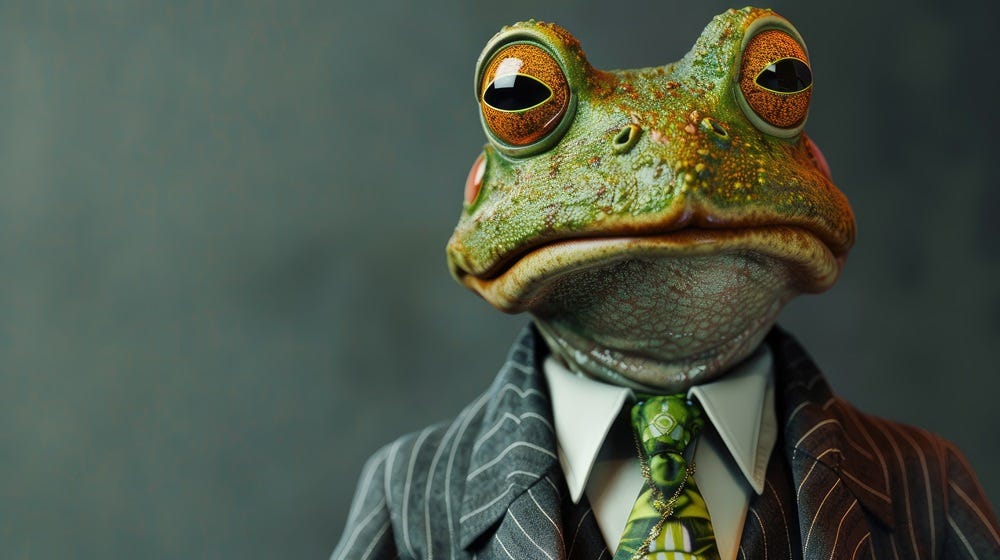"People Are Hard to Hate Close Up"
I've learned that reading about people is a poor substitute for talking to them.
A few months ago, I started researching the so-called "Dissident Right."
I was told that these folks were the worst of the worst. Jordan Peterson suggests that many of them suffer from "psychopathology." New York Times columnist David French says that they're driven by “blind rage and a quest for control.”
I expected to find edgelords and white supremacists, the kinds of people who would think it was funny to sit in their mom's basement and post memes about how a man's Jewish daughter ought to be fed into the ovens. I expected to find a bunch of loser whites who thought members of other races were barely human.
And to be fair, I did find some of that. One thing that every thoughtful commentator in the Dissident Right told me is that their movement has some deplorables in it.
But I also found a lot more.
I met one commentator who advocates for white identity politics. We jumped on a podcast together to discuss our disagreements. And I found something remarkable: rather than a loser living in his mom's basement, this was a man of remarkable courage and erudition. And his motive for advocating for white identity politics surprised me too: he said that he just wanted a world in which his kids would grow up and not be discriminated against. I disagree with both his diagnosis of the problem (I think anti-white discrimination is fairly fringe) and his proposed solution, but I can't kid myself that he and I don't share the same heart. I too want a world in which my future kids feel safe and loved for who they are.
I saw other things in the movement too. A couple of days ago I hopped on the phone with one of the standard bearers of the Dissident Right. He told me that he's a devout Christian who prays that God will use his work to do some good in the world. He has a crude sense of humor, but his motive isn't to hurt people; instead, he thinks he can poke bigger holes in what he sees as a broken system by being crude than he can by being tame and toothless.
I've also read some fascinating pieces by political philosophers on the Dissident Right. There's some race realism in there that I find gross and disturbing, and many of them seem to want to go back to 1950s-style sex relations which I can't endorse. But I also saw legitimate grievances having to do with our culture of consumerism and hedonism. I saw deep thinkers who made some surprisingly good points.
And all of this—the virtues of my new friends in the movement, the desire to use their admittedly crude writing to do some good in the world, the deep philosophy and thoughtful exploration of the ways in which modernity can lead us away from the good life—came as a complete surprise to me. Based on hearing people talk about the Dissident Right, I expected the scum of the earth. What I found was (generally) smart and well-intentioned people with whom I have some deep disagreements.
I've seen the same thing across the aisle.
I've spent years writing about what I see as the dangers and flaws of Critical Theory (the umbrella ideology that includes Critical Race Theory, Queer Theory, etc). And when I just heard Critical Theorists described on the right, or just saw their worst tweets or saw clips of the worst of them circulating on Fox News, I was sometimes tempted to think that this whole movement was just full of bad people.
But then I started to make friends with some Critical Theorists.
And I found something completely different.
I expected racists and provocateurs. What I found was thoughtful and caring teachers who were determined to use the tools of Critical Theory to find and root out prejudice in their schools and classrooms. I found people who really grappled with what they saw as the flaws of modern society and with how they could work to build something better.
I still disagree with them, often intensely. But I can no longer kid myself that wrong views are only ever held by bad people.
It all reminds me of two ideas I've heard lately.
First, the impression we get when we hear people talk about X group is often very different from the impression we get when we actually sit down and talk to X group. It turns out the game of telephone is a terrible way to learn about people.
Second, I'm reminded of that quote by Brené Brown: "People are hard to hate close up."
Heal the West is 100% reader-supported. If you enjoyed this article, please consider upgrading to a paid subscription or becoming a founding member. I greatly appreciate your support.



This Substack continues to be awesome! I recently challenged a friend on Facebook to talk to me over the phone about a post he made. I had to ignore a lot of nasty comments from other people, but managed to tune out the peanut gallery. And he agreed to a phone call! Arguing on Facebook instead of discussing over voice is always worse.